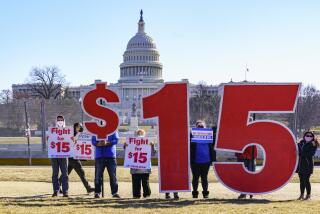Bush, Congress Agree on $4.25 Minimum Wage
- Share via
WASHINGTON — President Bush and congressional leaders agreed Tuesday to raise the minimum wage for the first time in nearly a decade, striking a hard-fought compromise that would increase the hourly rate by 45 cents in both 1990 and 1991.
The deal, ending a rancorous stalemate between Republican administrations and Democrat-led Congresses that stretched back to 1981, calls for boosting the base wage from the current $3.35 per hour to $4.25 by April 1, 1991.
That would occur three months later than the most recent demand of labor supporters in Congress, but nine months earlier than sought by Bush and the business community.
The new federal minimum wage, which would hit $3.80 next April 1 and $4.25 one year later, would have no impact in California, which already has a $4.25 statewide floor.
The compromise, which is expected to win approval by Congress this week, would also permit for the first time a subminimum “training wage” to be paid to teen-agers for up to six months. This also would not apply in California because of the state’s $4.25 base pay.
In announcing the deal, Democratic congressional leaders termed it a victory for low-paid workers but something less for the dueling political camps.
“It’s a step in the right direction, but it doesn’t go as far as I’d like,” said Rep. Augustus F. Hawkins (D-Los Angeles), chairman of the House Education and Labor Committee.
Even many of the working poor may see “this modest increase” as “a Halloween compromise that is more trick than treat,” said Sen. Edward M. Kennedy (D-Mass.), chairman of the Senate Labor and Human Resources Committee.
In a statement later, Bush said the package “gives relief to those with the greatest need in our work force while at the same time protecting job opportunities for young workers” through the new subminimum training wage.
Senate Minority Leader Bob Dole (R-Kan.) commended the President, congressional and union leaders--and his wife, Labor Secretary Elizabeth Hanford Dole--for reaching the agreement.
Sources said that Sen. Pete V. Domenici (R-N.M.) got the compromise ball rolling last week when he warned the White House that congressional Democrats were ready to push through a scaled-down bill that might survive a presidential veto--or, at the least, would create political embarrassment for Republicans.
Administration officials contacted union leaders--one source said that White House Chief of Staff John H. Sununu called AFL-CIO President Lane Kirkland--to explore their willingness to talk. Discussions began Friday and continued through the weekend, mostly involving Administration and union negotiators but including top congressional leaders at key junctures.
White House officials had suggested last week that Bush would agree to a minimum wage compromise if it could be tied to a reduction in the capital gains tax. But Democratic leaders, who are maneuvering to block the tax cut in the Senate, refused to give up the opportunity to accuse Republicans of helping the rich on capital gains while hurting the poor on the minimum wage.
Originally, Democratic leaders had pressed for a three-year hike reaching $4.55 by Oct. 1, 1991, but they scaled down the demand after Bush vetoed it last June, insisting that he would not accept anything more than an increase to $4.25.
With the average rank-and-file wage now about $10 per hour, the new minimum would have little impact on the economy. But Rep. Richard A. Gephardt (D-Mo.) noted that “it does mean a wage increase for millions of Americans.”
Under the deal, the subminimum training wage of $3.35 an hour in 1990 and $3.61 in 1991 would be subject to reapproval by Congress in three years.
It would be restricted to teen-agers between 16 and 19, would be limited to six months’ total work experience and could be paid in the last three months only if the employer ran a training program certified by the government.
Bush had opposed all such restrictions, whereas labor supporters had sought a two-month pay limit.
More to Read
Get the L.A. Times Politics newsletter
Deeply reported insights into legislation, politics and policy from Sacramento, Washington and beyond. In your inbox twice per week.
You may occasionally receive promotional content from the Los Angeles Times.










